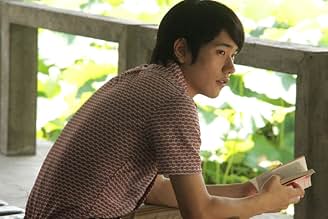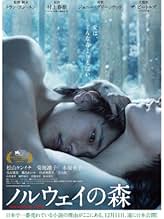टोरू अपनी 1960 के दशक की जिन्दगी को याद करता है, जब उसके दोस्त किज़ुकी ने खुद को खत्म कर लिया था और वह किज़ुकी की प्रेमिका नाओको और एक अन्य बिंदास महिला, मिडोरी के करीब आ गया था.टोरू अपनी 1960 के दशक की जिन्दगी को याद करता है, जब उसके दोस्त किज़ुकी ने खुद को खत्म कर लिया था और वह किज़ुकी की प्रेमिका नाओको और एक अन्य बिंदास महिला, मिडोरी के करीब आ गया था.टोरू अपनी 1960 के दशक की जिन्दगी को याद करता है, जब उसके दोस्त किज़ुकी ने खुद को खत्म कर लिया था और वह किज़ुकी की प्रेमिका नाओको और एक अन्य बिंदास महिला, मिडोरी के करीब आ गया था.
- निर्देशक
- लेखक
- स्टार
- पुरस्कार
- 4 जीत और कुल 9 नामांकन
- Student Activist
- (as Kohei Yoshino)
फ़ीचर्ड समीक्षाएं
The novel "Norwegian Wood" depicts the university days of the main character, Watanabe Tohru. In the novel, he lives in Tokyo, and goes to university. He likes reading American modern literature. He did not have any friends except for one best friend during his high school days, but the friend killed himself at the age of seventeen. Watanabe has several relationships with women between the age of 18 and 21. Some characters in the novel, other than Watanabe's best friend, have also killed themselves. The novel consists of sex, death, literature, and intelligence.
I went to university, and had some close female friends. In addition, I liked reading classic literature. Furthermore, I did not belong to a sport clubs at university, so the scope of my friendship was limited. In essence, I felt a sense of intimacy with Watanabe while reading the novel. (In fact, I learnt "The Catcher in the Rye" by J. D. Salinger and "The Great Gatsby" by F. Scott Fitzgerald from Norwegian Wood, and both books were the first English novels which I completed reading in their original language.) Norwegian Wood is an important book for me, so I was glad to hear, 2 to 3 years ago, that the movie version of this novel would be screened. The movie was released about one week ago, and I went to see it today.
Locations shot in the movie were beautiful, and the music sounds good. In particular, I was moved by one scene in which Reiko sang "Norwegian Wood" by the Beatles with a guitar, and Naoko lost her mental stability during Reiko's performance. In addition, the cast members in the movie were also good, especially Mizuhara Kiko, who played Midori, was very cute and vivid.
Since I have read the novel over and over, and remember the whole story in detail, I can go so far as to say that I do not need any explanation for the story in the movie. Because I know the story, I was purely interested in how the film director, Tran Anh Hung, had expressed the novel through the media of a movie.
The movie version of "Norwegian Wood" was not solely a converted version of the novel, but represented its originality and creativity with the help of movie techniques, such as music, voice (cry, laugh, or angry), facial expression, and scenery.
However, it is certain that those who have never read the novel will not enjoy the movie.
(The above comment is forwarded from my blog at http://metropolitantokyo.blogspot.com/)
Neo rates it 9/10.
- www.thehkneo.com
Both book and film are very Japanese. So be prepared for a slow pace, allowing you plenty of time to catch up with its story. Be prepared for a Japanese styling as well. The film also follows the book's plot, more precisely than we are used to in our Western world.
Nou doubt the film 'Norwegian wood' peaks with its acting. Here we talk true Japanese high quality. The unfortunate contrast is made by its disappointing picturing. One can only guess if this is due to a lack of money, or to the desire to apply to 1969-shooting methods.
All in all 'Norwegian wood' is an enjoyable & well made film, allowing you a pleasant evening in the cinema. Those around in 1969 will get themselves carried back to their young days.
All that remains now is nostalgia.
And that is why, critically acclaimed Japanese writer Haruki Murakami's novels spoke to so many people. His works poignantly captures the spiritual emptiness of the modern generation and explores the loss of human connection in the bustling society we live in today. And just when detractors thought that Murakami's bestselling 1987 novel was un-filmable, along comes Tran Anh Hung, whose past works include the award winning Cyclo (1995) and The Scent of Green Papaya (1993).
Set in Tokyo during the late 1960s, the film's male protagonist is Toru, a quiet and serious college student. He loses his best friend to suicide, and his personal life is thrown into turmoil. He becomes emotionally closer to his friend's ex-girlfriend Naoko, who shares the same sense of loss. Circumstances bring Naoko to a sanatorium, and Toru becomes devastated. Another girl, Midori, enters his life, and he realises that she is everything Naoko isn't. Torn between two women and feeling empty about life's past and future, what ensues is Toru's nostalgic journey of loss and sexuality.
The above synopsis probably doesn't do justice to Murakami's writing, which is known to be humorous and surrealistic. While we haven't read the original novel which this 133 minute film is based on, we have chanced upon Murakami's other works, and we must recognize Tran's decision to adapt the story into a feature film.
The first thing which grabs you is the hypnotically mesmerizing cinematography by the award winning Lee Ping Bin (In the Mood For Love, Three Times). The breathtaking mountainous landscapes of Japan are captured on Lee's lenses like gems. You can imagine yourself wandering through the green grasslands and the snowy grounds, letting the spectacle engulf your senses. To replicate the mood of 1960s, production designers Norifumi Ataka and Yen Khe Luguem have painstakingly created scene after scene of the film's characters journeying through life's alleys against backdrops of intricately decorated cafes, workshops and hostel rooms. The result is a visually pleasing mood piece which displays the director's eye for details. The soundtrack composed by Radiohead guitarist Jonny Greenwood completes the viewing experience with an enigmatic score.
Also commendable are the cast's performances. Playing Toru is Kenichi Matsuyama (Death Note's "L"). He has an empathetic vulnerability which leaves a lasting impression with viewers. Rinko Kichuki (Babel) displays the much needed frailty of Naoko's character without becoming overly melodramatic, while newcomer Kiko Mizuhara is charming as the charismatic Midori.
Like most literary adaptation, this film loses some of the novel's poignancy when it comes to character and plot development. Emotions are conveyed through convenient voiceovers, and the exploration of sexuality may appear preposterous to those who uninitiated to Murakami's works. Furthermore, the slow and meandering pacing of the two odd hour film may be a test of patience to some.
It will take audiences who are familiar with the postmodern writer's work to appreciate this film. If you are an individual who often indulges in poetic wistfulness, this may just be the perfect film for you on a contemplative evening too.
- www.moviexclusive.com
The cinematography of Norwegian Wood is excellent. So if you are big on cinematography, then this would be a good film to watch. Otherwise? Not so sure... I myself find the character of Watanabe very unappealing, and his appeal to Japanese women rather baffling, but maybe that's just a cultural difference.
क्या आपको पता है
- ट्रिवियाThis is only Jonny Greenwood's second film score, following his acclaimed work on There Will Be Blood (2007). Greenwood was keen to score the film as he was a big fan of the novel. His involvement was in some doubt, however, as Thom Yorke wanted to return to the studios to record a new Radiohead album. Greenwood found the time to balance both projects.
- भाव
Toru Watanabe: Nothing can heal the loss of a beloved. No truth, no sincerity, no strength, no kindness can heal that sorrow. All we can do is live through the sorrow and learn something from it. But whatever we learn will be of no help in facing the next sorrow that comes along.
- इसके अलावा अन्य वर्जनThe German TV version is 10 min shorter.
- कनेक्शनFeatured in At the Movies: Venice Film Festival 2010 (2010)
टॉप पसंद
विवरण
- रिलीज़ की तारीख़
- कंट्री ऑफ़ ओरिजिन
- आधिकारिक साइटें
- भाषा
- इस रूप में भी जाना जाता है
- Noruwei No Mori
- फ़िल्माने की जगहें
- उत्पादन कंपनियां
- IMDbPro पर और कंपनी क्रेडिट देखें
बॉक्स ऑफ़िस
- US और कनाडा में सकल
- $13,000
- US और कनाडा में पहले सप्ताह में कुल कमाई
- $13,000
- 8 जन॰ 2012
- दुनिया भर में सकल
- $1,91,44,719
- चलने की अवधि2 घंटे 13 मिनट
- रंग
- ध्वनि मिश्रण
- पक्ष अनुपात
- 2.35 : 1
इस पेज में योगदान दें



























